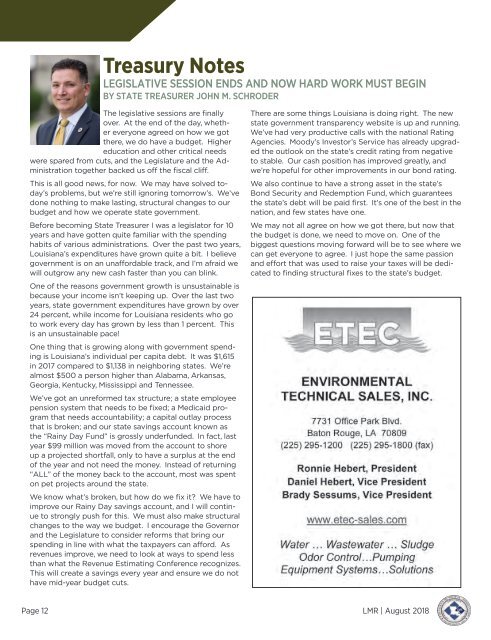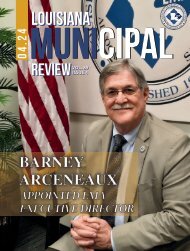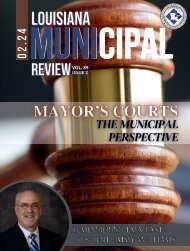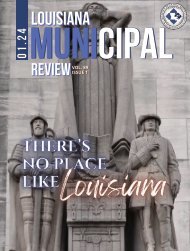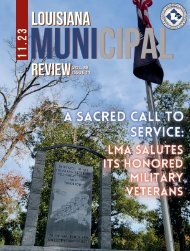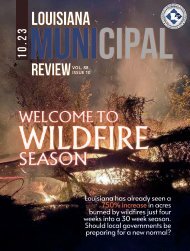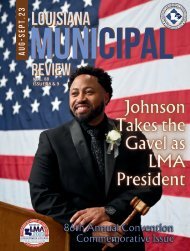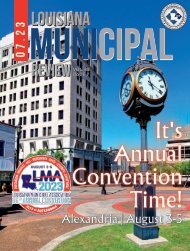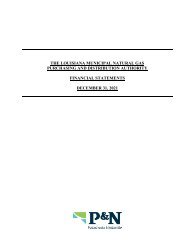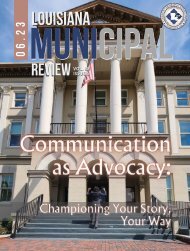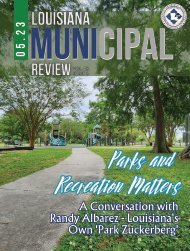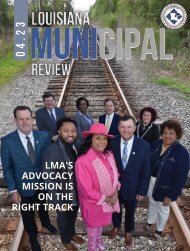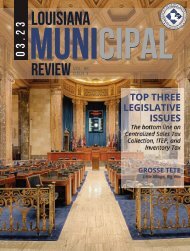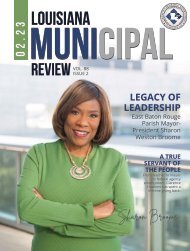LMR_August2018
Create successful ePaper yourself
Turn your PDF publications into a flip-book with our unique Google optimized e-Paper software.
Treasury Notes<br />
LEGISLATIVE SESSION ENDS AND NOW HARD WORK MUST BEGIN<br />
BY STATE TREASURER JOHN M. SCHRODER<br />
The legislative sessions are finally<br />
over. At the end of the day, whether<br />
everyone agreed on how we got<br />
there, we do have a budget. Higher<br />
education and other critical needs<br />
were spared from cuts, and the Legislature and the Administration<br />
together backed us off the fiscal cliff.<br />
This is all good news, for now. We may have solved today’s<br />
problems, but we’re still ignoring tomorrow’s. We’ve<br />
done nothing to make lasting, structural changes to our<br />
budget and how we operate state government.<br />
Before becoming State Treasurer I was a legislator for 10<br />
years and have gotten quite familiar with the spending<br />
habits of various administrations. Over the past two years,<br />
Louisiana’s expenditures have grown quite a bit. I believe<br />
government is on an unaffordable track, and I’m afraid we<br />
will outgrow any new cash faster than you can blink.<br />
One of the reasons government growth is unsustainable is<br />
because your income isn’t keeping up. Over the last two<br />
years, state government expenditures have grown by over<br />
24 percent, while income for Louisiana residents who go<br />
to work every day has grown by less than 1 percent. This<br />
is an unsustainable pace!<br />
One thing that is growing along with government spending<br />
is Louisiana’s individual per capita debt. It was $1,615<br />
in 2017 compared to $1,138 in neighboring states. We’re<br />
almost $500 a person higher than Alabama, Arkansas,<br />
Georgia, Kentucky, Mississippi and Tennessee.<br />
We’ve got an unreformed tax structure; a state employee<br />
pension system that needs to be fixed; a Medicaid program<br />
that needs accountability; a capital outlay process<br />
that is broken; and our state savings account known as<br />
the “Rainy Day Fund” is grossly underfunded. In fact, last<br />
year $99 million was moved from the account to shore<br />
up a projected shortfall, only to have a surplus at the end<br />
of the year and not need the money. Instead of returning<br />
“ALL” of the money back to the account, most was spent<br />
on pet projects around the state.<br />
We know what’s broken, but how do we fix it? We have to<br />
improve our Rainy Day savings account, and I will continue<br />
to strongly push for this. We must also make structural<br />
changes to the way we budget. I encourage the Governor<br />
and the Legislature to consider reforms that bring our<br />
spending in line with what the taxpayers can afford. As<br />
revenues improve, we need to look at ways to spend less<br />
than what the Revenue Estimating Conference recognizes.<br />
This will create a savings every year and ensure we do not<br />
have mid-year budget cuts.<br />
There are some things Louisiana is doing right. The new<br />
state government transparency website is up and running.<br />
We’ve had very productive calls with the national Rating<br />
Agencies. Moody’s Investor’s Service has already upgraded<br />
the outlook on the state’s credit rating from negative<br />
to stable. Our cash position has improved greatly, and<br />
we’re hopeful for other improvements in our bond rating.<br />
We also continue to have a strong asset in the state’s<br />
Bond Security and Redemption Fund, which guarantees<br />
the state’s debt will be paid first. It’s one of the best in the<br />
nation, and few states have one.<br />
We may not all agree on how we got there, but now that<br />
the budget is done, we need to move on. One of the<br />
biggest questions moving forward will be to see where we<br />
can get everyone to agree. I just hope the same passion<br />
and effort that was used to raise your taxes will be dedicated<br />
to finding structural fixes to the state’s budget.<br />
Page 12<br />
<strong>LMR</strong> | August 2018


